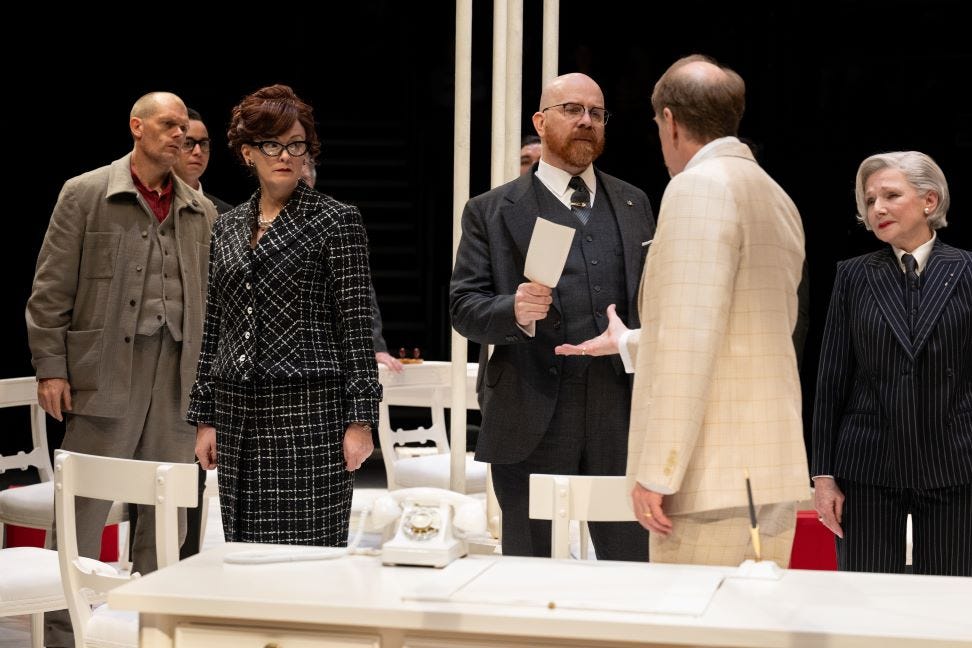
This is an eccentric beast of a play which will be enjoyed chiefly by the policy nerds and readers of history, as well as Tom Rooney completists (guilty as charged on all three counts). Rest of the audience may enjoy the acting and the intellectual one-upmanship among the principal characters, but Shaw’s piece from 1928, which takes the side of an enlightened and wise monarch against a greedy and corrupt but democratically elected government, puts us all in an awkward position of rooting for a constitutional formula that has been chucked to the dustbin of history.
Tom Rooney plays the wise and debonair King Magnus – whose life in some of its features mirrors Shaw’s – who refuses to give up his inherited right to influence law-making and governing in a British Empire as Shaw imagined it would be in 1967. This is an Alice Through the Looking Glass version of the UK that hasn’t lost the colonies, hasn’t gone through World War Two, the Cold War, the Suez, the birth of the welfare state and the NHS, nor the tremors of the 1960s, and in which the greatest threat comes from left-wing populism and the corrupting reach of corporate monopolies into electoral politics. The right-wing populism is not even a blip on the horizon, nor is mass migration. England is prosperous thanks to the off-shoring of manufacturing labour to much cheaper countries. Its population is content, prosperous and apolitical. They do like their monarch, though.
As you can see, certain aspects of the play come across as incredibly prescient while others are just bizarro. At the centre of drama is the prime minister (Graeme Somerville) and his careerist minions in the cabinet trying to turn the monarch into the rubber-stamper-in-chief, and him, seeing their flaws all too clearly, refusing and using every trick at his disposal to derail them. But this is exactly what happened in the intervening years – heads of state in constitutional and parliamentary monarchies are rubber-stampers now, and while the cabinet loses the battle in this play, it will, we have the benefit of the future, win the war. The unelected senate today in some well-functioning parliamentary democracies, on a good day, performs the role that Shaw gave to Magnus. The UK’s House of Lords with its mix of inherited and appointed peers sometimes does offer the sober second thought on legislation that’s been pushed through by a partisan majority in the House of Commons. The Canadian Senate, populated via sinecures for political loyalties and with regional representation in mind, only occasionally does its job. Canadian political parties mostly don’t have much to say on the topic of the Senate. (Federal conservatives, post-unification with their Reform faction, made some noises about abolishing it many years ago.) Occasionally a Senator with integrity will speak out on the madness of something coming down the Commons’ pike (for example, Senator Linda Frum expressing her modest reservations about the introduction of trans self-ID in the guise of adding ‘gender identity and expression’ to the protected characteristics of the human rights code). But generally Canadian Senators don’t cover themselves in glory even though, like monarchs, they do not need to pander to their constituents or the political party that brung them.
We now know that individuals not beholden to an electorate do not automatically assume independence. I think it mattered to Shaw in this play to set this conversation up as the individual (Magnus) vs the group (the cabinet; the corporation that owns them all, Breakages, Ltd). He was also pro-women and pro-female franchise, and the sole female characters occupying positions of power (The Powermistress General and the Postmistress General - Sharry Flett and Rebecca Northan, respectively) are on the side of reason, moderation, independence from corporate power, and wit. In other words, they are on Magnus’ side (and often sit by his side). It was the early years of women’s franchise and women in electoral politics, perhaps, no one knew yet, would bring something different, smarter, less hasty, more… again, witty. (He gives the capacity for comedy to the good guys.) Alas. We now know that as part of existing political systems, women are populist-ing and conservative-ing with the best of ‘em, and some even reach the highest echelons of power, like countless men before them, with their incompetence intact.
There are three other women in this male-heavy cast, Magnus’ poised daughter (who flirts with the government minister who built his political career on his hard-scrabble background), his wife the Queen (a short one-scene role without much dramatic impact) and his lover (an important one-scene role). The private chamber interlude with Magnus and his lover Orinthia (Sochi Fried) adds some badly needed blood flow to the show and kickstarts a much livelier second part, post intermission. (Judging by the number of closed eyes around the auditorium during cabinet deliberations in Act 1, it wasn’t only me who almost dozed off.) The set is very basic and mostly white, with audiences on all four sides of the small Jackie Maxwell Studio Theatre. The director Eda Holmes, with set and costume designer Judith Bowden, gave the costumes a sort of off-kilter 1960s aesthetic, a mix of Alice in Wonderland, Fluevog, and Monty Python. There will be bowler hats.
It’s a hard play to make work. Recommended as a rarity; this one’s not likely to come back on any stage near you any time soon.
On until October 7. The Shaw Festival shuttle bus leaves Toronto at 10 a.m. on select performance dates, and departs NOTL the same day around 5 p.m., which will only suit for matinees. Shuttle is a pleasant enough experience, except for the last leg of the trip back, the Toronto weekend gridlock. For any evening performances at the Shaw Festival, you will have to drive to and from NOTL or stay overnight; trains are of no help, with the last Niagara Falls-Toronto GO train leaving around 9 p.m.



